Main Directions Of High-Tech Enterprise`S Business Processes Transformation Under Digital Economy Conditions
Abstract
This study is considering the most relevant areas of high-tech enterprise`s business processes transformation under the Russian economy digitalization conditions. The subject of this study was individual issues how to apply lean manufacturing principles, kaizen principles, automation of business processes and talent management concept. Implementation of these areas into practice requires solving the problems of the high-tech enterprise`s management system transformation, taking into account the widespread industry digitalization. The research methodology was analytical in nature; the author focuses to prove the need for lean manufacturing, kaizen, business process automation and talent management at each enterprise. The main research methods were: analysis of implementation benefits of lean manufacturing principles; analysis of implementation role of kaizen principles; analysis of business process automation possibilities; analysis of implementation importance of talent management concept. The novelty and scientific value of this paper lies in the fact that the result of study was a justified author's approach to study issues of high-tech enterprise`s business processes transformation in transition to digital economy, as well as proven need for lean manufacturing, use of kaizen principles, business process automation and applying of talent management. It is concluded that, in practical terms, the proposed areas of transformation will serve as the basis for increasing the business performance, improving the management system and production business processes of high-tech enterprises under integrated Russian industry digitalization conditions.
Keywords: Lean manufacturingkaizenautomationtalent management
Introduction
Transition of economy to digital format necessitates various transformations of the main and auxiliary high-tech enterprise`s business processes. Among them, one can separately note such relevant areas:
implementation of lean manufacturing principles;
implementation of kaizen principles;
automation of business processes;
Implementation of talent management concept.
The activities of high-tech enterprises are constantly changing, and today one of the main trends is digitalization, which implies the active use of advanced technologies in management domain. Moreover, the activity of any enterprise cannot be effective without established system for managing its business processes.
The digital economy is changing the traditional ideas about control systems and communication systems, adding more and more new business processes based on digital technologies.
The active use of such technologies transforms the existing high-tech enterprise`s business models, contributes to implementation of innovative products and services, the creation of new management processes, increase the efficiency level and the formation of completely new management culture.
Problem Statement
Digitalization processes raise before economists and managers a number of problems of scientific and practical importance and the main among them is the need for timely enterprise`s business processes transformation. Transformation methods in this case shall comply with the ongoing technical progress. Continuous improvement of high-tech enterprise`s business processes is becoming the main approach to meeting the digital economy requirements and aimed at transforming all business activity areas with emphasis on supporting effective management decisions.
The main problem of the Russian economy transition to the digital development path is that enterprises being unable to correctly prioritize the transformation of their business processes may lose market leadership, becoming less efficient and uncompetitive.
Teamwork of managers at all levels of government and business analysts is able to provide the high-quality digital conversions. Naturally, this will require the right tools that will seamlessly improve the high-tech enterprise`s business processes.
Research Questions
The following questions were raised during this study:
What are the implementation benefits of lean manufacturing principles during high-tech enterprise`s business processes transformation under digital economy conditions?
What is the implementation role of kaizen principles during high-tech enterprise`s business processes transformation under digital economy conditions?
What are the possibilities of business process automation during high-tech enterprise`s business processes transformation under digital economy conditions?
What is the importance of talent management concept implementation during high-tech enterprise`s business processes transformation under digital economy conditions?
The solution of these issues will be built taking into account transition of high-tech enterprises into digital format.
Purpose of the Study
The purpose of this study is to analyze the main directions of high-tech enterprise`s business processes transformation under digital economy conditions.
It is assumed that the answers to the posed research questions will contribute to the development of recommendations for improving the high-tech enterprise`s business processes transformation efficiency during digitalization.
The goal of this scientific article will be achieved as result of this analysis.
Research Methods
Analysis of the implementation benefits of lean manufacturing principles
Production efficiency has never been more important for high-tech enterprises than now, when the entire global economy is going through its digitalization phase. This is especially true for the Russian Federation, wherein are higher costs for running any business. This puts most manufacturers at competitive disadvantage as compared to market leaders in other countries.
High-tech enterprises may maximize productivity and minimize costs, reduce waste to such amount as to maintain the market competitiveness. That`s why high-tech enterprises must actively implement the lean manufacturing principles during transition to digital economy.
Lean manufacturing is a set of specific methods that aim to minimize the loss of feedstock, materials and labour force while maintaining or increasing labour productivity (Nigmatzyanov & Permyakov, 2018).
The result of lean manufacturing implementation is elimination of those production elements or business processes that do not add value, and providing customers with the best products as soon as possible (Antikainen et al., 2018; Kazmina, 2017).
Lean manufacturing obviously improves efficiency, reduces waste and improves productivity. That`s why its advantages are diversified (figure
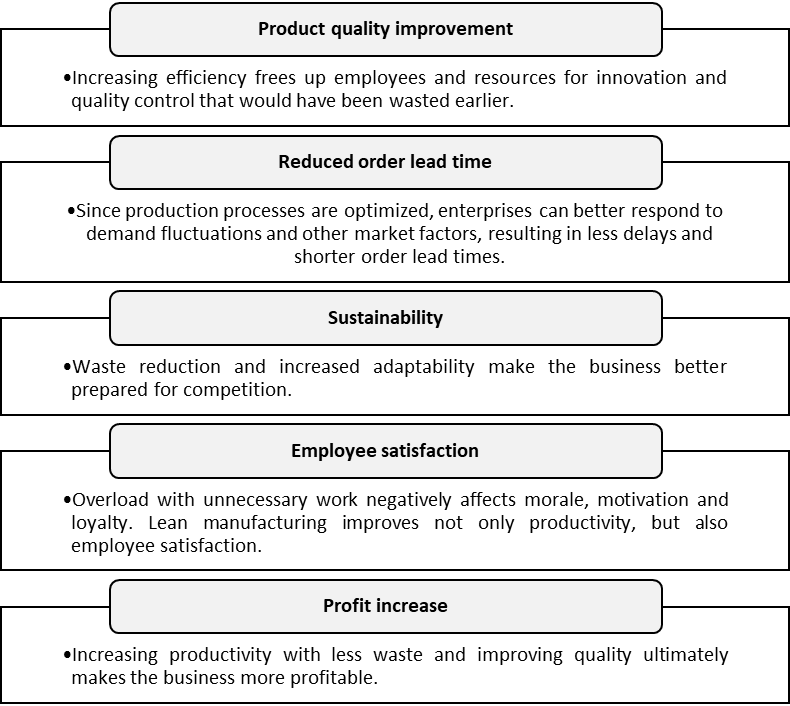
Implementation of lean manufacturing principles means identifying and eliminating ineffective business processes specific to particular high-tech enterprise and replacing them with more optimized lean business processes (Okorie et al., 2018).
Practically, the following measures shall be undertaken:
Assessment and mapping of primary and secondary business processes to better understand the exact waste area. After completed analysis of business processes, it becomes possible to identify existing problems that may be further eliminated or optimized (Urasova, 2019).
Automation of production processes. The most automated business processes are necessary for lean manufacturing implementation. But we may not forget about the regular quality inspection of completed work.
Reduction of stocks and implementation of the kanban system. As per the lean manufacturing principles, stock levels shall be strictly regulated and preferably using the kanban system, which will enable replenishing or replacing of basic stocks and production stock only strictly as necessary.
Employee training. Employees shall be trained not only in lean manufacturing principles, but also in specific methods and business processes of lean manufacturing, which must be used to increase work efficiency (Tsirenshchikov, 2019).
Analysis of the implementation role of kaizen principles
Kaizen principles are based on methodology of small and gradual improvements, which will subsequently help high-tech enterprise to achieve optimization of business processes. Kaizen aims to encourage and motivate employees to be creative in making of changes.
The advantages of kaizen and its important role in high-tech enterprise digitalization are proved by the many years of experience of the companies that applied it (figure
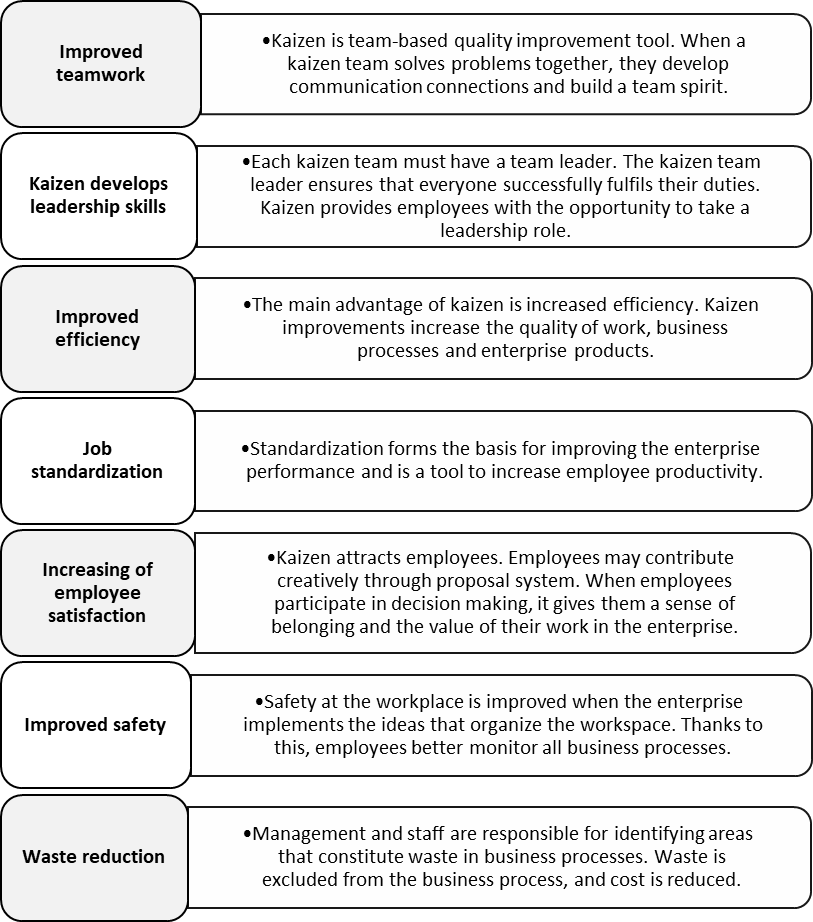
Thus, implementation of kaizen principles in high-tech enterprise enable the rational use of all resources and optimizes business processes. Enterprise’s labour productivity is growing as well as its profits. Kaizen also enables to effectively evaluate the work of employees and their work-improvement suggestions. Generally, this method of continuous improvement helps enterprises to achieve great success and increase their competitiveness.
Analysis of business process automation capabilities
Today, high-tech enterprise companies are seeking to use every possibility of deploying new tools and process improvements to increase their productivity and get advantages over their competitors. To do that it is crucial to maximize utilization of all available resources. One of the most promising approaches to do that is automation of business processes by deployment of modern digital technologies achievements. Every day number of small and big businesses, that chose to automate their processes in order to increase their productivity, reduce costs and optimize workflows, goes up (Lozovskaya & Mikhailov, 2018; Trofimova, 2020).
This kind of automation reduces time consumption for repetitive tasks by using software technologies. As a result, valuable human resources can be released and redirected to the main activities of high-tech enterprises that still require mostly human work (Podpovetnaya et al., 2018).
Among the most important fields of application for automation software there are customer billing, inventory and stock management, customer support and many others. Regardless of the nature of the company business and its size deployment of automated business processes may become a winning strategy in the contemporary digital economy(Nagy et al., 2020; Rosa et al., 2020). The main features of business process automation are (figure
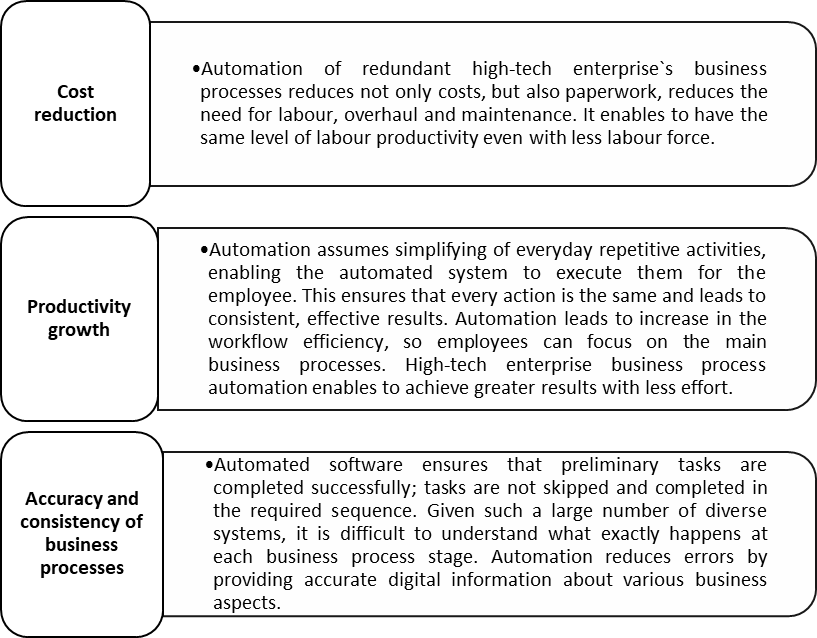
Thus, today during transition to digital economy, the business process automation becomes the most important strategy for high-tech enterprise development. With efficient automation tools, it may be managed business workflows; ensure uniform interaction with all employees, intermediaries, customers; automate redundant tasks and ultimately increase the entire enterprise efficiency.
Analysis of the importance of talent management concept implementation
Human resources during transition to digital economy are becoming the most important factor that has a strong impact on the efficient operation of any high-tech enterprise. Moreover, the main competitive advantage are talented employees whose skills must be regularly improved and developed as part of the business process of staff management generally and talent management particularly.
Despite the fact that there has been made little domestic research on this topic, it has already become obvious that in today's world win those high-tech enterprises, which are able to help the most talented employees at all management system levels. More and more managers recognize that the company`s success depends not only on financial capabilities, but also on professional skills of talented employees who direct their activities towards achieving the enterprise`s goals (Tkachenko et al., 2019). To make the business as profitable as possible, it is necessary to form team of talents, since the enterprise effectiveness depends on people.
The following talent management categories can be distinguished (Kurina, 2019):
Category A. Promising, productive employees providing the high professional result from their activities.
Category B. Employees with limited innovative potential that have predictable result from their professional activities.
Category C. Employees with minimum talent level and low productivity of their professional activities.
This separation raises the problem of correct combination of these categories as the ratio of workers to management methods. It may be avoided by professional and personal growth, ensuring effectiveness.
To ensure that the company achieves the high result from its activity, it is necessary:
to develop Category A employees,
to demote Category B employees,
to transfer Category B employees to another field of activity, to train how to apply their skills.
This approach gives employees the opportunity to grow professionally and move up the career ladder, not only within their department, but also moving to other company divisions. At the same time, companies have problems with implementation of talent management system that is associated with resistance to change. The main obstacles to implementation of talent management system are (figure
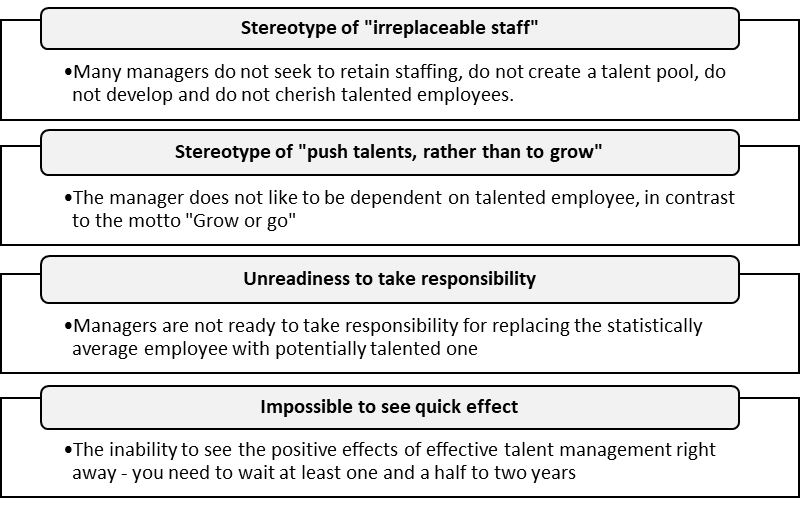
Talented employees are inclined to end their working careers at the workplace where career prospects, opportunities for self-fulfillment and self-development are not visible.
Talent management at the enterprise shall be implemented using improved professional tasks, coaching and mentoring.
Also, talent development requires staff turnover, which will enable to get new professional skills in various fields of knowledge. However, in most enterprises, these activities are made not as ongoing process, but as one-time action (Bukh & Heeks, 2018).
Regarding the Russian experience in the field of talent management, it is most often the experience in forming of talent pool and, in very rare cases, succession planning. According to this approach, there may be distinguished three levels of talent management (figure
So, more and more high-tech enterprises are beginning to realize that the ability to manage talent is becoming a strategically important task. Talent management may not be isolated from the overall strategy of enterprise transformation during transition to digital economy (Polevaya, Dzappala, & Elena, 2018). Only those enterprises that attract or grow their own talented staff are capable of functioning effectively in market conditions.
Enterprises shall take a course not only on cultivation of talents, but also on their continuous search. Even if all vacancies are filled, this will create a talent pool and engage in succession planning.
Talent management shows that today it is seen as tool to attract, use and reproduce talented employees and increase their labour potential. Techniques and methods of talent management are the most important factor in the leadership of high-tech enterprises in the market.
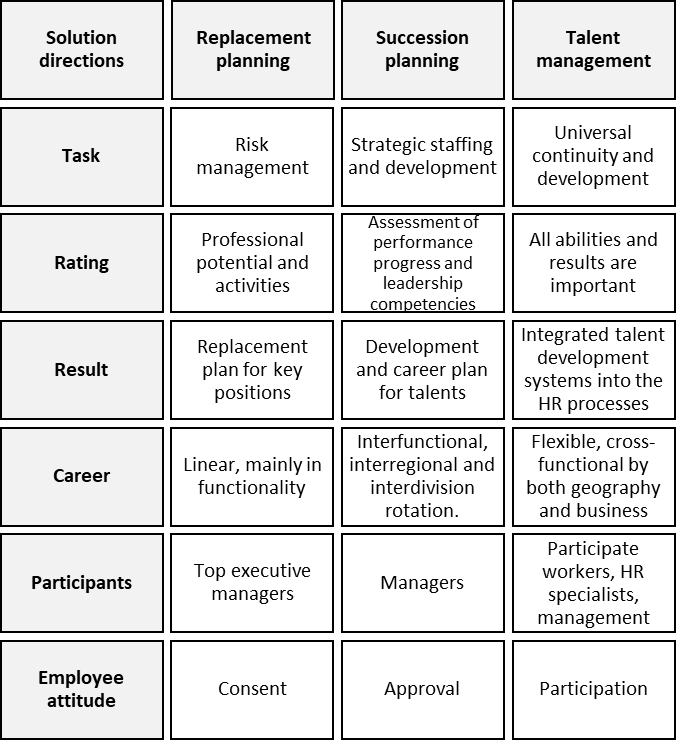
Findings
Implementation of proposed areas of high-tech enterprise`s business processes transformation under digital economy conditions will give many advantages:
Cost reduction and enterprise resource saving,
Labour productivity growth,
Improving the work quality of employees,
Optimization and automation of business processes,
Development of human resources and increasing their satisfaction,
Increasing the enterprise’s profitability.
Conclusion
Managing the high-tech enterprise`s transformation processes based on optimization of business processes under digital economy conditions is a method that organizes and implements targeted actions in a structured way. This brings them in line with the enterprise`s goals and ensures maximum integration between various functions and processes.
The main directions of high-tech enterprise`s business processes transformation under digital economy shall lie in the implementing plane of lean manufacturing and kaizen principles, as well as the most complete automation of business processes and application of talent management concept.
References
- Antikainen, M., Uusitalo, T., & Kivikyto-Reponen, P. (2018). Digitalisation as an enabler of circular economy. Procedia CIRP, 73, 45-49. https://doi.org/10.1016/j.procir.2018.04.027
- Bukh, R., & Heeks, R. (2018). Opredelenie, contseptsiya i izmereniye zifrovoy economiki [Definition, concept and measurement of the digital economy]. International Organisations Research Journal, 13(2), 143–172. https://doi.org/10.17323/1996-7845-2018-02-07
- Kazmina, I. V. (2017). Analiz osobennostey vnedreniya berezhlivogo proizvodstva na otechestvennykh predpriyatiyakh [Analysis of the features of the implementation of lean production at domestic enterprises]. Territory of Science, 3, 129-135. [in Rus.]
- Kurina, T. N. (2019). Kontseptsiya upravleniya talantami kak osoboy kategoriyey rabotnikov organizatsii [The concept of talent management as a special category of organization employees]. Management Sciences, 3, 86-95. https://doi.org/10.26794/2304-022X-2019-9-3-86-95
- Lozovskaya, Y. N., & Mikhailov, M. V. (2018). Sovremennyye kontseptsii upravleniya proizvodstvom: dostoinstva i nedostatki [Modern concepts of production management: advantages and disadvantages]. Gornyy informatsionno-analiticheskiy byulleten (nauchno-tekhnicheskiy zhurnal), 3, 159-167. https://doi.org/10.25018/0236-1493-2018-3-0-159-167
- Markov, D. A., & Markova, N. A. (2018). Practices of kaizen implementation at industrial enterprises. Journal of new economy, 19(5), 130-140.
- Nagy, J., Olah, J., Erdei, E., Mate, D., & Popp, J. (2020).The role and impact of industry 4.0 and the internet of things on the business strategy of the value chain-the case of hungary. Sustainability, 10(10), 3491. https://doi.org/10.3390/su10103491
- Nigmatzyanov, A. Z., & Permyakov, A. S. (2018). Perspektivy berezhlivogo proizvodstva v Rossii [Prospects for lean manufacturing in Russia]. Bulletin of Science and Education, 18-1(54), 65-67. [in Rus.]
- Okorie, O., Salonitis, K., Charnley, F., Moreno, M., Turner, C., & Tiwari, A. (2018). Digitisation and the circular economy: a review of current research and future trends. Energies, 11, 3009. https://doi.org/10.3390/en11113009
- Podpovetnaya, Y. V., Najmiddinov, A. M., Ovsyanitskaya, L. Y., & Ovsyanitskiy, A. D. (2018). The improvement and automation of the processes of the products reception and assembly in the Trade-Warehouse complex. Bulletin of the South Ural State University. Ser. Computer Technologies, Automatic Control, Radio Electronics, 18(4), 160-169. https://doi.org/10.14529/ctcr180416
- Polevaya, M. V., Dzappala, S., & Elena, V. K. (2018). Upravleniye talantami: traktovka, sistematizatsiya, opyt [Talent management: interpretation, systematization, experience]. Management Sciences, 4, 104-111. https://doi.org/10.26794/2404-022X-2018-8-4-104-111
- Rosa, P., Sassanelli, C., Urbinati, A., Chiaroni, D., & Terzi, S. (2020). Assessing relations between circular economy and Industry 4.0: a systematic literature review. International Organisations Research Journal, 58(6), 1662-1687. https://doi.org/10.1080/00207543.2019.1680896
- Tkachenko, E., Rogova, E., Dmitriev, N., & Bodrunov, S. (2019). Valuation of Intellectual Capital in the Context of Economic Potential of a Company. In 10th European Conference on Intangibles and Intellectual Capital (ECIIC 2019) (pp. 303-314). University of Chieti-Pescara.
- Trofimova, N. N. (2020). Klyuchevyye problemy sovremennogo korporativnogo upravleniya predpriyatiyami realnogo sektora ekonomiki [Key problems of modern corporate governance of enterprises of the real sector of economy]. Business Strategies, 8(3), 70-74. https://doi.org/10.17747/2311-7184-2020-3-70-74
- Tsirenshchikov, V. (2019). Tsifrovizatsiya ekonomiki Yevropy [Digitalization of the European economy]. Contemporary Europe, 3, 104‒113. https://doi.org/10.15211/soveurope32019104113
- Urasova, A. A. (2019). Regionalnyĭ promyshlennyĭ kompleks v tsifrovuyu epokhu: informatsionno-kommunikatsionnoye izmereniye.[Regional industrial complex in the digital age: information and communication dimension]. Economy of Region, 15(3), 684-694. https://doi.org/10.17059/2019-3-5
Copyright information

This work is licensed under a Creative Commons Attribution-NonCommercial-NoDerivatives 4.0 International License.
About this article
Publication Date
21 October 2020
Article Doi
eBook ISBN
978-1-80296-089-1
Publisher
European Publisher
Volume
90
Print ISBN (optional)
-
Edition Number
1st Edition
Pages
1-1677
Subjects
Economics, social trends, sustainability, modern society, behavioural sciences, education
Cite this article as:
Trofimova, N. N. (2020). Main Directions Of High-Tech Enterprise`S Business Processes Transformation Under Digital Economy Conditions. In I. V. Kovalev, A. A. Voroshilova, G. Herwig, U. Umbetov, A. S. Budagov, & Y. Y. Bocharova (Eds.), Economic and Social Trends for Sustainability of Modern Society (ICEST 2020), vol 90. European Proceedings of Social and Behavioural Sciences (pp. 1316-1325). European Publisher. https://doi.org/10.15405/epsbs.2020.10.03.152

